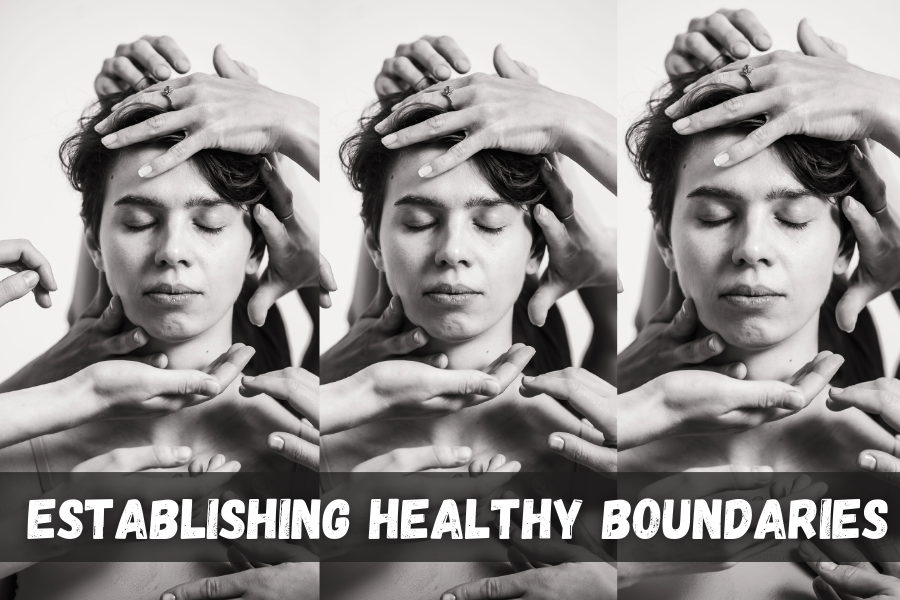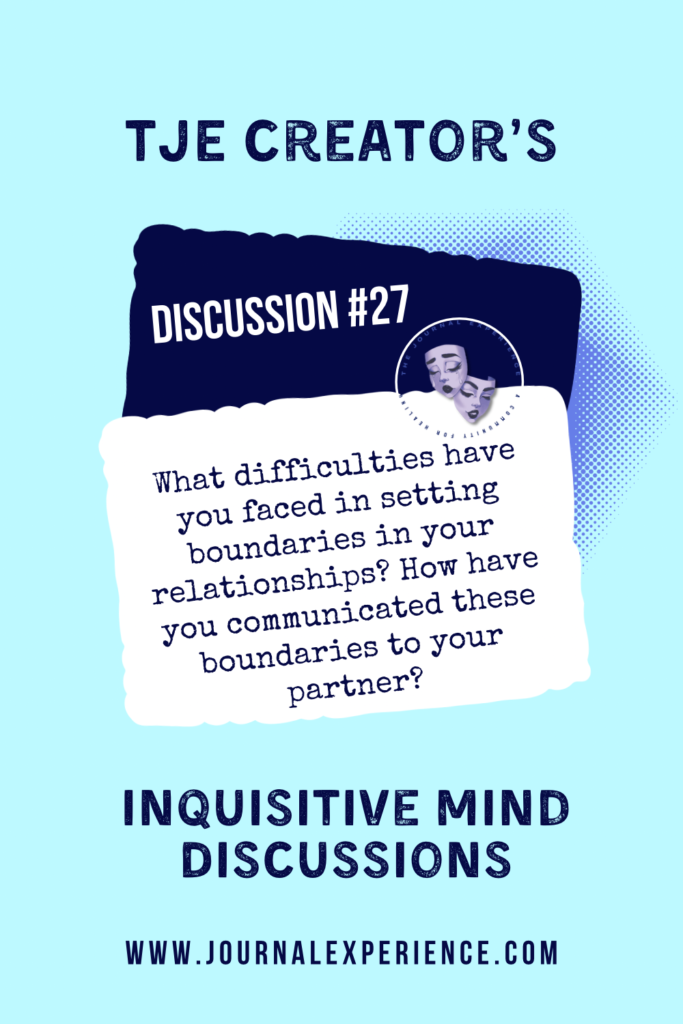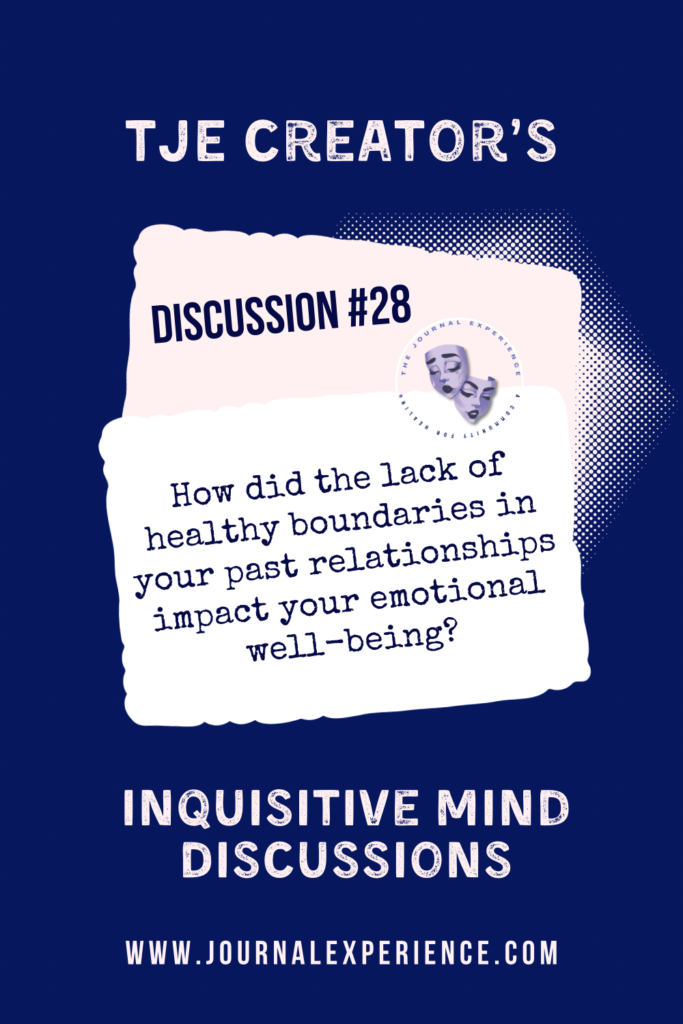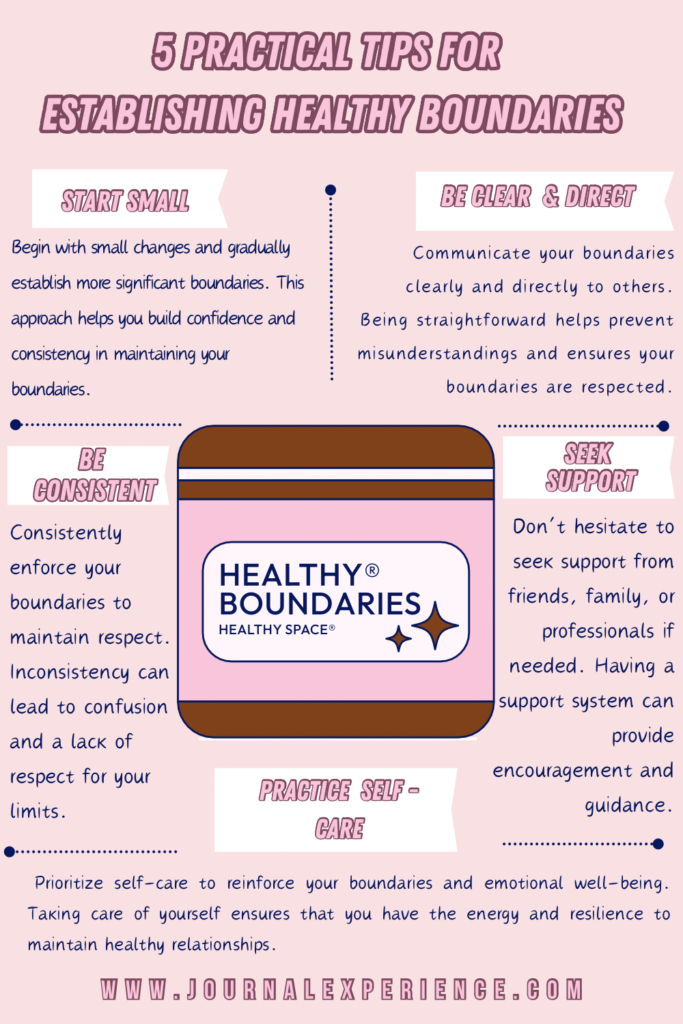Healthy boundaries are essential for maintaining emotional well-being and mutual respect in any relationship.

They help protect our personal space, time, and emotional health, ensuring that we can interact with others without feeling overwhelmed or undervalued.
Establishing boundaries is a vital step towards building strong, respectful, and fulfilling relationships. This blog post will explore how to establish healthy boundaries, the signs that indicate the need for boundaries, the importance of maintaining them, and practical tips for implementation.
How to Establish Healthy Boundaries
Personal Space & Time
Everyone needs their personal space to feel comfortable and secure. Respecting physical boundaries ensures that both partners feel safe and valued in the relationship. Here’s what some strategies that I’ve came to believe to work better then others:
- Alone Time: Allowing Each Other Time Alone to Recharge and Pursue Individual InterestsAlone time is essential for personal growth and mental health. It allows individuals to recharge, reflect, and pursue their interests independently. Respecting each other’s need for alone time fosters a healthy relationship dynamic.
- Time with Friends: Allowing Each Other to Spend Time with Friends Without Jealousy or Resentment : Encouraging each other to maintain friendships outside the relationship is crucial. It prevents dependency and promotes a healthy, balanced social life.
Communication
Honest communication is the foundation of any healthy relationship. Being truthful while remaining kind and considerate helps build trust and respect, and you can ensure that you achieve that by doing the following:
- Active Listening: Listen to Each Other Without Interrupting or Dismissing Feelings : Active listening involves fully engaging with your partner’s words and emotions without interrupting or dismissing their feelings. This practice strengthens the emotional connection and fosters mutual understanding.
- Respectful Communication: Speak to Each Other Respectfully, Even During Disagreements: Maintaining respectful communication, even during disagreements, is crucial for preserving the relationship’s integrity and mutual respect.
- Raising Voices : Agree to Avoid Yelling or Shouting During Arguments : Agreeing to avoid yelling or shouting ensures that disagreements are handled constructively, without causing emotional harm.
- Taking Breaks: Take Breaks During Heated Arguments to Cool Down and Think Clearly : Taking breaks during heated arguments allows both partners to cool down and think more clearly, preventing escalation and promoting resolution.
Emotional Boundaries
Emotional boundaries are the invisible lines that define and protect our emotional space, ensuring that we maintain a healthy balance between our own needs and the needs of others. These boundaries help us manage our emotions, communicate effectively, and build respectful relationships. Here are a few ways to establish and maintain emotional boundaries in your relationships:
- Respecting Feelings: Acknowledging and Respecting Each Other’s Feelings and Emotions : Acknowledge and respect each other’s feelings validates their experiences and promotes a supportive relationship environment.
- Expressing Needs: Being Able to Express Needs and Wants Without Fear of Judgment or Backlash : Being able to express your needs and wants openly and without fear of judgment or backlash is vital for maintaining personal integrity and emotional health.
If expressing your needs feels unsafe or overwhelming, it could be rooted in unaddressed codependent dynamics. The Codependency Therapy | Self Love Recovery Treatment Program helps you reclaim your emotional boundaries and learn how to communicate from a place of self-worth and inner peace.
- Privacy: Respecting Each Other’s Privacy, Including Private Thoughts, Journals, and Digital Devices : Respecting each other’s privacy, including private thoughts, journals, and digital devices, fosters trust and respects personal boundaries.
Social Boundaries
Social boundaries are essential for maintaining a healthy and balanced relationship. They involve understanding and respecting each partner’s need for personal space and autonomy within their social interactions. Here are a couple of boundaries that allow each partner to maintain their individuality while ensuring that the relationship remains strong and supportive :
- Social Activities: Respecting Each Other’s Need to Participate in Social Activities Independently : Respect your partner’s need to participate in social activities independently promotes individuality and prevents feelings of suffocation.
- Family Boundaries: Establishing Boundaries with Extended Family to Protect the Relationship : Establish boundaries with extended family helps protect the primary relationship and ensures that both partners’ needs are prioritized.
Responsibility and Accountability
Responsibility and accountability are crucial elements in any healthy relationship. They involve recognizing the importance of owning one’s actions, being willing to apologize, and showing mutual respect. By embracing these principles, couples can build trust, foster personal growth, and create a supportive environment that allows both partners to thrive. Here’s what you need to master when building a relationship rooted in responsibility and accountability:
- Personal Responsibility : Taking responsibility for your own actions and not blaming your partner for individual issues fosters a healthy relationship dynamic and encourages personal growth.
Want to go deeper in understanding the roots of your relational patterns? The 11-Stage Self-Love Recovery Treatment Program and the Healing The Inner Trauma Child (HITCH) Method help you take accountability from a place of compassion—not shame—by working through unresolved emotional wounds.
- Apologizing: Being willing to apologize when wrong and accepting apologies graciously demonstrates maturity and respect for your partner.
- Mutual Respect : Showing mutual respect for each other’s values, opinions, and beliefs is fundamental for a harmonious and fulfilling relationship.

Life Goals & Priorities
Establishing healthy boundaries is essential for creating a balanced and fulfilling relationship. It involves open communication, mutual respect, and a clear understanding of each partner’s needs and aspirations.
When it comes to life goals and priorities, setting boundaries ensures that both partners feel supported in their personal ambitions while staying aligned on their shared vision for the future.
Here’s how to effectively establish boundaries that nurture both individual and shared goals in a relationship:
- Shared Goals: Discussing and aligning on major life goals and priorities ensures that both partners are moving in the same direction and supports long-term relationship satisfaction.
- Individual Goals: Supporting each other’s individual goals and ambitions without feeling threatened promotes personal growth and strengthens the relationship.
Signs You Need to Establish Healthy Boundaries
Recognizing the need for boundaries is the first step towards establishing them. Without clear boundaries, you may find yourself feeling overwhelmed, resentful, or even losing your sense of self. There are several signs that indicate you may need to define and enforce personal limits to protect your mental, emotional, and physical health. Here are some signs that indicate boundaries may be necessary:
- Feeling Overwhelmed: Constantly Feeling Overwhelmed by Someone’s Needs and Demands : If you constantly feel overwhelmed by someone’s needs and demands, it may be a sign that boundaries are needed.
- Resentment: Frequently Feeling Resentful or Frustrated Because Your Needs Are Being Ignored : Frequent feelings of resentment or frustration can indicate that your needs are being ignored and boundaries need to be established.
- Difficulty Saying No: Struggling to Say No to Requests That Infringe on Your Time, Energy, or Values : If you struggle to say no to requests that infringe on your time, energy, or values, it may be time to set boundaries.
- Emotional Exhaustion: Feeling Emotionally Drained After Interactions with Certain Individuals : Feeling emotionally drained after interactions can indicate that boundaries are needed to protect your emotional well-being.
If you’re constantly feeling drained or guilty for putting yourself first, there’s often a deeper story beneath the surface. Explore the Webinar on the Origins of Codependency and Pathological Narcissism and the Codependency Cure™ to better understand these cycles—and how to break free.
- Guilt for Prioritizing Yourself: Experiencing Guilt or Anxiety When Putting Your Own Needs First : Experiencing guilt or anxiety when prioritizing your needs suggests that you may need to establish healthier boundaries.
- Loss of Identity: Feeling Like You’re Losing Your Sense of Self to Someone Else’s Expectations : If you feel like you’re losing your sense of self to someone else’s expectations, it’s crucial to establish boundaries to maintain your identity.
- Inability to Make Decisions: Struggling to Make Decisions Independently Due to Fear of Others’ Reactions : Struggling to make decisions independently due to fear of others’ reactions indicates a need for boundaries to regain your autonomy.
- Feeling Controlled: Sensing Someone is Trying to Control Your Actions, Thoughts, or Feelings : Feeling controlled by someone else is a clear sign that boundaries need to be established to protect your independence.
- Poor Communication: Difficulty Communicating Your Needs and Boundaries Clearly and Assertively : Difficulty communicating your needs and boundaries clearly and assertively suggests that you need to work on establishing and enforcing boundaries.
- Excessive Responsibility: Taking on Excessive Responsibility for Someone Else’s Emotions or Problems : Taking on excessive responsibility for someone else’s emotions or problems indicates a need for boundaries to maintain a healthy emotional balance.
- Ignoring Personal Values: Compromising Your Personal Values or Beliefs to Accommodate Someone Else : Compromising your personal values or beliefs to accommodate someone else suggests that boundaries need to be reinforced to protect your integrity.
- Overextending Yourself: Frequently Overcommitting Your Time and Energy, Leading to Burnout : Frequently overcommitting your time and energy can lead to burnout, indicating a need for boundaries to protect your well-being.
- Feeling Unappreciated: Feeling Like Your Efforts and Sacrifices Are Unappreciated or Taken for Granted : Feeling unappreciated or taken for granted indicates that boundaries are needed to ensure your efforts and sacrifices are respected.

The Importance of Establishing Healthy Boundaries
Establishing healthy boundaries is essential for overall well-being and fulfilling relationships. By setting limits and prioritizing your needs, you can significantly improve various aspects of your life. Here are a few ways to do just that :
- Avoiding Burnout : Healthy boundaries help prevent emotional and physical burnout by ensuring that you do not overextend yourself or neglect your own needs.
- Retaining Your Identity : Maintaining a sense of self and individuality in relationships is essential for personal growth and satisfaction. Boundaries help you retain your identity and respect your values.
- Improving Self-Esteem : Boundaries play a crucial role in boosting self-confidence and self-worth by ensuring that your needs and feelings are respected and valued.
Practical Tips for Establishing Healthy Boundaries
Setting and maintaining healthy boundaries is a crucial step towards self-care and fulfilling relationships. By defining your limits and communicating them effectively, you can protect your emotional and physical well-being while nurturing stronger connections with others.
- Start Small : Begin with small changes and gradually establish more significant boundaries. This approach helps you build confidence and consistency in maintaining your boundaries.
- Be Clear and Direct : Communicate your boundaries clearly and directly to others. Being straightforward helps prevent misunderstandings and ensures your boundaries are respected.
- Be Consistent : Consistently enforce your boundaries to maintain respect. Inconsistency can lead to confusion and a lack of respect for your limits.
- Seek Support : Don’t hesitate to seek support from friends, family, or professionals if needed. Having a support system can provide encouragement and guidance.
- Practice Self-Care : Prioritize self-care to reinforce your boundaries and emotional well-being. Taking care of yourself ensures that you have the energy and resilience to maintain healthy relationships.
Conclusion
Establishing healthy boundaries is essential for emotional well-being and mutual respect in relationships.Healthy boundaries are crucial for avoiding burnout, retaining your identity. By recognizing the need for boundaries, communicating them clearly, and maintaining consistency, you can create a more fulfilling and respectful relationship dynamic.
Join The Journal Experience Community , where you can share your experiences and find support from others who are also working on establishing healthy boundaries..

Connect with like-minded individuals, access additional resources, and read related blog posts on personal growth and relationship dynamics. Together, we can create a supportive environment for emotional well-being and mutual respect.